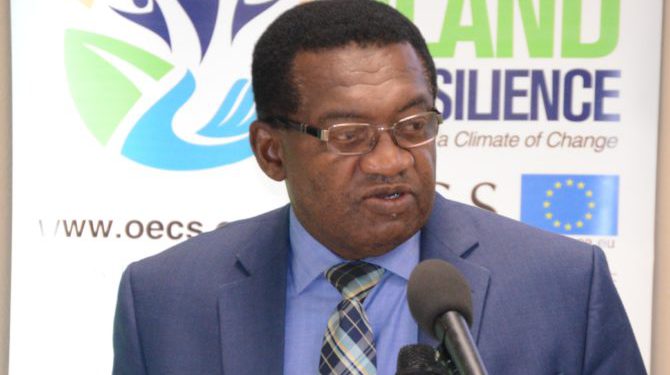Port of Spain, November 08, 2017 – Climate change and disaster management practitioners and policy makers and civil society groups in St. Kitts and Nevis participated in a national consultation from October 2-4, 2017 to develop a National Climate Change Adaptation Strategy to address the impacts of climate change and build resilience. The Caribbean Natural Resources Institute (CANARI) co-facilitated the national consultation with the Department of Environment, Minister of Agriculture, Marine Resources, Cooperatives, Environment and Human Settlements in St. Kitts and Nevis.
The aim of the consultation was to gain input from government, civil society and the private sector on their needs, priorities and relevant adaptation actions for key sectors to inform a National Climate Change Adaptation Strategy. At the national consultation workshop, the Honourable Minister of Agriculture, Marine Resources, Cooperatives, Environment and Human Settlements, Mr. Eugene Hamilton, noted the high level of vulnerability of Caribbean islands to climate change and highlighted the damage to St. Kitts and Nevis and its neighbours, especially Antigua and Barbuda, Anguilla, Dominica and St Maarten, in the wake of Hurricanes Irma and Maria.
He welcomed the collaboration between his Ministry and CANARI which will help operationalise the new National Climate Change Policy that is currently before parliament. He also highlighted the importance of investing in adaptation and the critical need for support from the Green Climate Fund and other climate finance mechanisms. The Honourable Minister of Agriculture, Marine Resources, Cooperatives, Environment and Human Settlements, Mr. Eugene Hamilton (left) addressing participants at the national consultation workshop. Stakeholders worked together at the consultation workshop to identify priority sectors to be addressed in the National Climate Change Adaptation Strategy highlighting the agriculture, fisheries and coastal and marine resources, public health, tourism and water sectors.
They also identified specific adaptation measures, opportunities and constraints for adaptation within these sectors and potential arrangements for effective implementation of the strategy. Community focus groups were also held with farmers, fisherfolk, small businesses and other community-based organisations in St. Kitts and in Nevis as part of the national consultation to identify their specific needs, the local impacts of climate change and potential measures to ensure concrete action on the ground.
CANARI and the Department of Environment will continue to work over the next year with stakeholders in St. Kitts and Nevis to develop the National Climate Change Adaptation Strategy and enable effective uptake and mobilisation of resources for the identified adaptation measures. This initiative is being implemented under the Organisation of Eastern Caribbean States (OECS) Global Climate Change Alliance Project, iLAND Resilience – Promoting a Climate for Change, funded by the European Union (EU). The overall aim of the iLAND Resilience project is to support the implementation of the OECS St. George’s Declaration of Principles for Environmental Sustainability, namely the protection and sustained productivity of the OECS countries’ natural resources.










